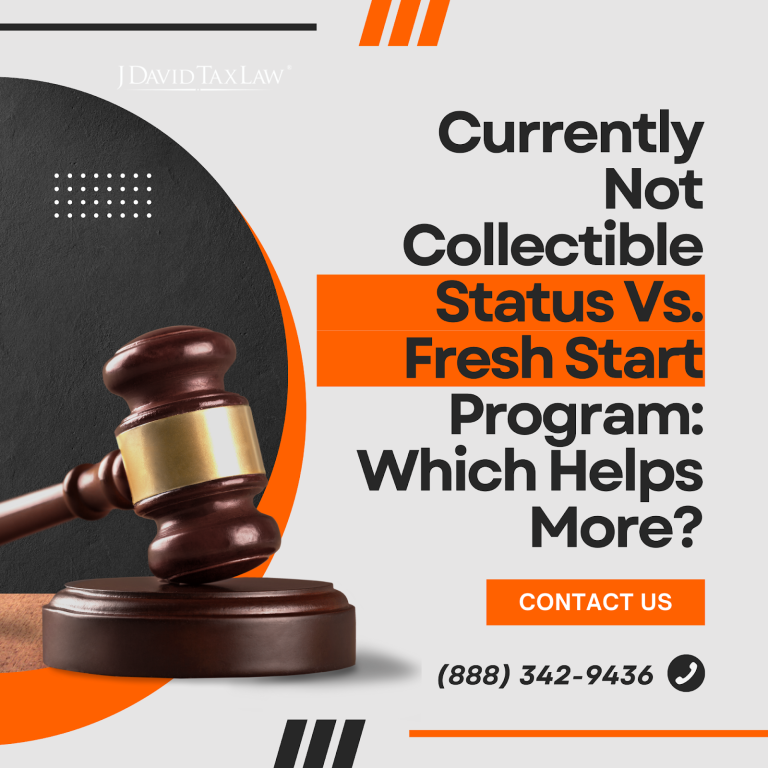
Yes, a tax attorney can negotiate with the IRS on your behalf,reducing penalties and resolving tax debt.Call our IRS tax relief attorney at (888) 342-9436.





Dealing with tax debts can be a challenge, especially when facing financial hardship. Taxpayers often find themselves overwhelmed by tax liabilities and IRS procedures.
In response, the IRS offers two relief programs: Currently Not Collectible (CNC) status and the Fresh Start Program. Each program addresses specific pain points, providing taxpayers with means to manage or reduce their tax burden.
When taxpayers face financial hardship and cannot meet their tax obligations, the IRS may declare their debt as Currently Not Collectible (CNC). This status halts collection actions like bank levies and wage garnishments. This helps taxpayers manage basic living expenses without the immediate pressure of having to make an installment agreement to the IRS or suffering other collection efforts.
CNC status offers temporary relief until the taxpayer’s financial situation improves, however, if the financial situation does not improve then the taxpayer will continue to be eligible for CNC status and eventually the tax debt will expire when it reaches the collection statute expiration date. Eligibility hinges on thorough documentation proving that the taxpayer’s monthly income is offset by monthly living expenses.
The Fresh Start Program aims to help more taxpayers find relief from overwhelming tax debts through more flexible terms. This program includes several components such as penalty abatement, offers in compromise, and installment agreements.
Its primary goal is to help taxpayers regain financial stability by making it easier to negotiate with the IRS. It’s also designed to reduce their outstanding tax balance and avoid significant penalties. The Fresh Start Program also raises the dollar threshold for tax liens, helping to preserve taxpayers’ credit scores.
Here are the steps and necessary documents for the application:
Collection Information Statement (Form 433-F or 433-A): Submit a detailed statement that outlines all financial details. This includes income, living expenses, and debts.
Proof of Income: Provide recent pay stubs, Social Security benefits statements, and any other sources of income.
Monthly Expense Breakdown: List all monthly expenses such as rent, utilities, food, and medical bills.
Supporting Documents: Include bank statements, medical bills, and other relevant documentation to prove financial hardship.
The Fresh Start Program offers various relief options, each with its application process. Here’s how to apply for some of the key components:
Offers in Compromise (Form 433-A (OIC)): Apply to settle tax debts for less than the amount owed if paying the full amount would cause financial hardship.
Initial Payment: Submit a non-refundable payment along with the application, based on the chosen payment option.
Application Fee: Pay a fee unless you qualify for the low-income certification, which waives this cost.
Streamlined Installment Agreements: For simpler and faster application processing, beneficial for smaller debt amounts.
Online Application: Use the IRS Online Payment Agreement tool to set up a payment plan.
Proof of Income: Provide evidence that supports your ability to make regular payments under the agreement.
Penalty Abatement: Request to reduce or remove penalties due to reasonable cause or first-time penalty abatement.
Written Request: Provide a detailed letter explaining the reason for failing to meet tax obligations on time, often due to circumstances beyond control.
To qualify for CNC status, the IRS requires proof that the taxpayer cannot currently pay their tax debts without causing significant financial hardship. Here are the primary criteria for eligibility:
Financial Hardship: Show that all income is consumed by living expenses and there is no ability to pay tax debts.
Proof of Living Expenses: Provide detailed documentation of monthly living expenses such as housing, utilities, food, transportation, and health care.
Insufficient Assets: Show that there are no significant assets that could be liquidated to pay the debt.
The Fresh Start Program is designed to help more taxpayers, but it still has specific eligibility requirements. These are tailored to each component of the program, ensuring that relief is provided fairly:
Income Levels: Eligibility depends on the taxpayer’s current income compared to the tax debt. The IRS considers the taxpayer’s ability to pay when assessing eligibility.
Tax Debt Limits: Certain components, like streamlined installment agreements, have debt thresholds that must not be exceeded.
Compliance with Tax Filings: Taxpayers must be current with all filing requirements and not have any unfiled tax returns.
Not Currently in Bankruptcy Proceedings: Eligibility requires that the taxpayer not be involved in active bankruptcy proceedings during the application.
The CNC status offers several immediate and significant benefits to taxpayers facing severe financial challenges:
Suspension of Collection Efforts: Immediate halt on IRS collection actions such as wage garnishments, bank levies, and other forceful collection measures. The 10 year statute of limitations continues to run during this time.
No Mandatory Monthly Payments: While under CNC status, taxpayers are not required to make payments towards their tax debts.
Preservation of Basic Living Standards: CNC status acknowledges that all of a taxpayer’s income is needed for essential living expenses, thus protecting these funds from being diverted to tax debts.
Potential Reduction in Overall Debt: There’s a possibility that some of the debt may become uncollectible over time due to the expiration of the statute of limitations on tax debts.
The Fresh Start Program provides various benefits that help taxpayers regain financial stability and resolve tax debts more manageably:
Penalty Relief: Offers opportunities to reduce or eliminate penalties for late payment or failure to file, which can decrease the total tax debt.
Options for Lien Withdrawal: Taxpayers can apply for withdrawal of federal tax liens, which improves their credit score and facilitates easier access to credit.
More Manageable Installment Agreements: Simplified application processes and extended terms for installment agreements make it easier to manage payments and fit them into a taxpayer’s budget.
Offers in Compromise: Allows taxpayers to settle their tax debts for less than the full amount owed if full payment would cause financial hardship.
Fresh Start for More Taxpayers: Expands eligibility criteria, making relief accessible to a broader range of taxpayers, including those with higher debt amounts or more complex tax situations.
CNC status is ideal for those facing severe financial distress where paying taxes might impede meeting essential living expenses. It offers temporary relief from IRS collection actions, making it suitable for individuals whose financial situation may or may not improve over time.
The Fresh Start Program is suited for taxpayers who can manage regular, smaller payments and are looking to settle sizable tax debts without damaging their credit score. This program provides options for reducing penalties and withdrawing liens.
Navigating tax relief options often requires expert guidance. Tax professionals at firms like J. David Tax Law play a crucial role in this process. They evaluate financial situations, recommend appropriate relief programs, and guide individuals through the application steps. This ensures that decisions are well-informed and tailored to individual financial needs.
Understanding the differences between the Currently Not Collectible Status and the Fresh Start Program is crucial for anyone grappling with tax debts. Each option offers unique benefits, tailored to different financial situations. Making the right choice can alleviate the stress of tax liabilities and contribute to long-term financial stability.
To ensure you choose the best path forward based on your specific circumstances, consult with experienced tax professionals. Their expertise can be instrumental in navigating these complex decisions.
Our tax relief attorneys specialize in tax problems and tax debt resolutions
Get started with a 100% free consultation

Yes, a tax attorney can negotiate with the IRS on your behalf,reducing penalties and resolving tax debt.Call our IRS tax relief attorney at (888) 342-9436.

Struggling with IRS and state tax debts? Learn how to deal with your situation without missing deadlines or risking enforcement. Call (888) 789-5011 for a free consultation!

Remove IRS tax liens through payment, withdrawal, discharge, or subordination. Learn which option fits your situation. Call (888) 789-5011 for free legal consultation.
Get IRS Tax Assistance Within 24 Hours